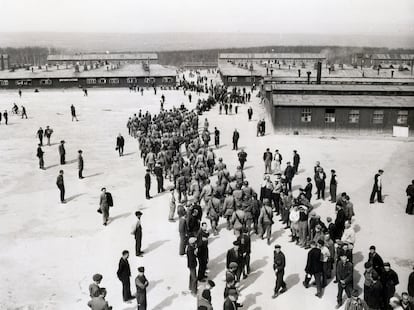Historical commemorations are often more a reflection of the present – its conflicts and obsessions – than of the past that is intended to commemorate. This has happened this year during the preparations for the acts in memory of the 80th anniversary of the release of the Buchenwald concentration camp, on the outskirts of the German city of Weimar.
Within the framework of this Sunday’s ceremonies, he had to pronounce an Omri Boehm speech, Israelo-German philosopher who has reflected in his work on Israel, historical memory, enlightenment and universalism in times of identity withdrawal and nationalism. Boehm, grandson of a holocaust and author survivor, among others, of essays such as Radical Universalism: Beyond identity (Taurus), Kant and Spinoza is claimed. He is a nuance thinker, little prone to the thick stroke and the controversy, although relentlessly critical of the current government of his country, Israel (and also with the part of the left that has shown sympathies or understanding towards Hamas).
It doesn’t matter: finally, Boehm will not be able to speak in Buchenwald, at least on the scheduled date, as revealed on Wednesday The mirror. Cancellation, according to this publication, is the result of the pressures of the Israel Embassy in Berlin, which accuses the philosopher of relativizing the holocaust, and Buchenwald’s memorial to insult the memory of the victims inviting him.
The context is particular, eight decades after the fall of the Hitler regime, which murdered six million Jews. The war in Gaza, the accusations of genocide against the government of Benjamín Netanyahu, the weight of the Holocaust in contemporary Germany and the special relationship of this country with Israel survive the celebration of liberation in 1945 of the Nazis fields. And this, at a time of boom of anti -Semitic acts in Europe, a part of them in the Muslim community, and appropriation of the fight against anti -Semitism by the extreme right related to Netanyahu, the same ideology that historically champion the hatred of the Jews.
“Very much to our regret, the invitation to Omri Boehm led to a conflict with the representatives of the Israel government, which unfortunately also involved survivors of the fields,” he explained, in a statement, Jens-Christian Wagner, director of the Buchenwald memorial. The situation, he adds, put commemorations at risk. “Worse, the survivors, many of whom are emotionally injured, ran the danger of being instrumentalized and being mixed with this conflict.” The postponement of the discourse “protects” the survivors and allows them to, and not “a debate initiated from abroad” lead the act.
The incident reopens a debate that has been accentuated since Hamas’s attack on October 7, 2023 against Israel and Israel’s response in Gaza. It is the debate on the relationship between Germany and Israel, about the support of Israel as a “state reason” for Germany and on the repeated episodes of exhibitions, film festivals, book fairs in which they have disqualified as anti -Semitic, or silenced, critical voices with Israel.
Coinciding with the controversy for commemoration in Buchenwald, the newspaper The Intercept He has revealed this week that, covered by the aforementioned “state reason”, the authorities of the city-state of Berlin have initiated the procedures to expel four foreign activities, three of them citizens of the EU and one American one. In March, a Munich court condemned an activist of Palestinian origin to a fine for having used, in two demonstrations, the slogan “from the river to the sea, Palestine will be free”, slogan that, according to the German Ministry of the Interior, is identified with Hamas and questions the existence of Israel.
The Holocaust and Gaza
In a speech in Germany in 2022, Boehm addressed the question of centrality of the Holocaust in German identity, and what are its implications: support Israel as a “state reason”? Or support a universal fight against all discriminations? “If being German needs to be responsible for the past of the Holocaust,” he said, “and I think it must be so, then the responsibility for the past should not imply accepting discrimination against the Palestinians, or against anyone.” The philosopher defends a future of Israel not as a Jewish state – something that, in his opinion, enters into contradiction with the principles of a liberal democracy – but as a Federal and Binational Republic.
Boehm’s positions have already caused angry reactions in the past, as in Vienna when pronouncing their Speech to Europebut the significant is the date and place: the commemoration in Buchenwald, where the Nazis locked 277,800 people and died 56,000. Israel’s harsh accusation against his citizen has led an editorialist from the conservative Frankfurter Allgemeine Zeitung To ask: “Does anyone at the embassy in Berlin or in the Israel government will take the trouble to read Boehm’s books or any of their essays?” And remember, as an example, a recent article in which, writes the editorialist, Boehm advocated a “most careful” use of a term “morally loaded” as a genocide, because “it could distract from the crucial issue: if a war or illegally is being released.”
“I have known Omri for years and what the Israeli government says is a real lie,” says the philosopher Susan Neiman, American, based in Berlin, Jewish, and author of Left is not woke (Debate). “It is difficult to know what to think about OMRI’s cancellation except that it is a clear sign that things are going worse. For those who are involved in these battles, the surprising, in fact, is that it would not have been canceled so far, when others have been.” Boehm prefers not to rule, for now. In a brief statements to the newspaper Frankfurter RundschauHe said that Wagner’s position and the memorial reflect his. The fundamental thing now, according to the philosopher, is that the ceremony takes place where it corresponds, with the survivors of the Holocaust, and without distractions.

